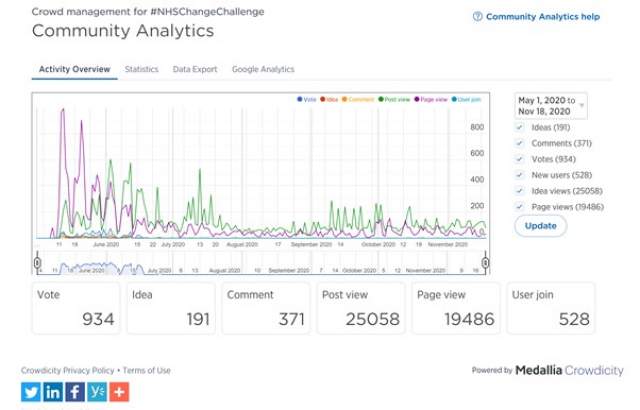Why It Matters
Response to the pandemic has driven innovation. Moving out of the first wave, NHS England and Improvement (NHSEI) recognised that there was a need to capture and document these innovations and the Beneficial Changes Programme was conceived. Within this, we were given the opportunity to use a crowdsourcing approach to gather ideas. We used a web-based idea management platform to identify innovations across the spectrum of Musculoskeletal (MSK) sub-specialities. At the heart of this was an ethos of co-production, engaging those with relevant lived experience along with health professionals.
We rapidly engaged the MSK community from across the nation to share their innovations on the platform. We divided the request into a series of challenges: primary and community assessment and triage, rheumatology, pain management, rehabilitation, and spinal conditions. Orthopaedics was split into planned and elective care, and urgent and emergency care. Additional challenges included identifying what had stopped in response to COVID-19 that should not restart, and partnerships focussed on engaging input from those with relevant lived experience.
A champion who was a recognised specialist in a field was assigned to each challenge. In collaboration with stakeholders representing professionals and patients, we launched a social media campaign using the #NHSchangechallenge hashtag to encourage the MSK community to register as platform users, propose innovations aligned to relevant challenges, and comment (“like” or “dislike”) on ideas posted to the platform.
The campaign ran over a 7-week period from May 7, 2020, to June 30, 2020. Traffic to the website was predominately driven by our Twitter campaign, with over 1,500 tweets and over 5 million impressions. Despite pausing access to users to post ideas, visits to the site continued. By the end of August, we had 494 registered users, 191 ideas posted, 370 comments, and 934 likes/dislikes. The ideas had been viewed over 16,000 times. Activity and interest in the community continued well past the end of the campaign:

Ideas submitted within each challenge were evaluated by a small group of health care professionals and people with relevant lived experience led by their champion. We used a bespoke evaluative tool called FETCH (Framework for the Evaluation of healThcare Crowdsourced cHanges). This comprises a 4-step approach consisting of a thematic filter, then an impact and feasibility analysis building to a case for change. Each idea was given a score out of 10 for impact and feasibility.
Champions contacted users who posted the highest scoring ideas and asked them to produce a short slide set describing the proposed change, potential impact, and suggested plans to embed into service delivery. This has allowed the most impactful ideas to be shared with the MSK community for further commentary and helped prioritize what matters to people who use services rather than focusing on processes, outcomes, or procedures.
The success of this crowdsourced initiative highlighted the importance of putting people with lived experience at the heart of an improvement process. It also made clear the value of health care professionals and champions listening to and valuing the opinions of people who know first-hand how MSK care can be improved. Lived Experience Partner Mark Agathangelou commented:
Initially, I found the experience exhilarating but a little overwhelming. However, I quickly settled in thanks to the welcoming, supportive atmosphere. The tone was pragmatic and non-hierarchical with everyone treated equally. My comments were appreciated, and I was encouraged to question and challenge whenever I thought appropriate. I genuinely felt that I was providing a distinctive and valuable patient focused perspective to the process. The lived experience presence made a difference, grounding the discussion, and helping to keep it focused on the needs of patients and the public. I believe that we made a positive input to the overall scoring and outcome.
Including people with relevant lived experience on an equal basis also made a strong impression on NHS staff. NHSEI Lived Experience Ambassador Cristina Serrão described this effort as “a pivotal moment where a shift in mindset was clear and potentially could be the beginning of a culture change in the NHS.” She added, “There was an acceptance of working with people who use our services, with relevant lived experience, at a strategic level.”
As well capturing and sharing innovation, this process has helped drive the ethos of co-production which remains at the heart of the emergent Best MSK Health National Pathway Improvement programme. This helps to drive transformation of MSK care aligned with the NHSEI 2021/22 operational priorities.
Everyone involved was passionate and showed their vulnerabilities, opening the opportunity for fantastic conversations. Bringing champions, health care professionals and those with lived experience together resulted in mutual respect and an appreciation that each has a key role in aiding the patient through their journey. Those with lived experience involved in this project have gone on to be involved in NHSEI’s Beneficial Changes Programme, in which lived experience is recognised and championed by senior NHSEI leaders as an essential element to the future design and delivery of NHS services.
Andrew Bennett, National Clinical Director for Musculoskeletal NHS England and Improvement; Sasha Karakusevic, Director, NHS Horizons; Alex Trompeter MBBS BSc FRCS (Tr+Orth), Orthopaedic Trauma/Limb Reconstruction Surgeon, St. George's University Hospital, London; Professor Chris Moran, National Strategic Incident Director, NHS England and Improvement; Cristina Serrão, Lived Experience Ambassador, NHS England and Improvement; Mark Agathangelou, Lived Experience Partner with NHS England and Improvement; and Sue Brown, Chief Executive Officer, Arthritis and Musculoskeletal Alliance.
You may also be interested in:
Why Do We Fear Co-Producing Health with Patients?
Engaging Patients and Families in Safety: Recommendations, Resources, and Case Examples
